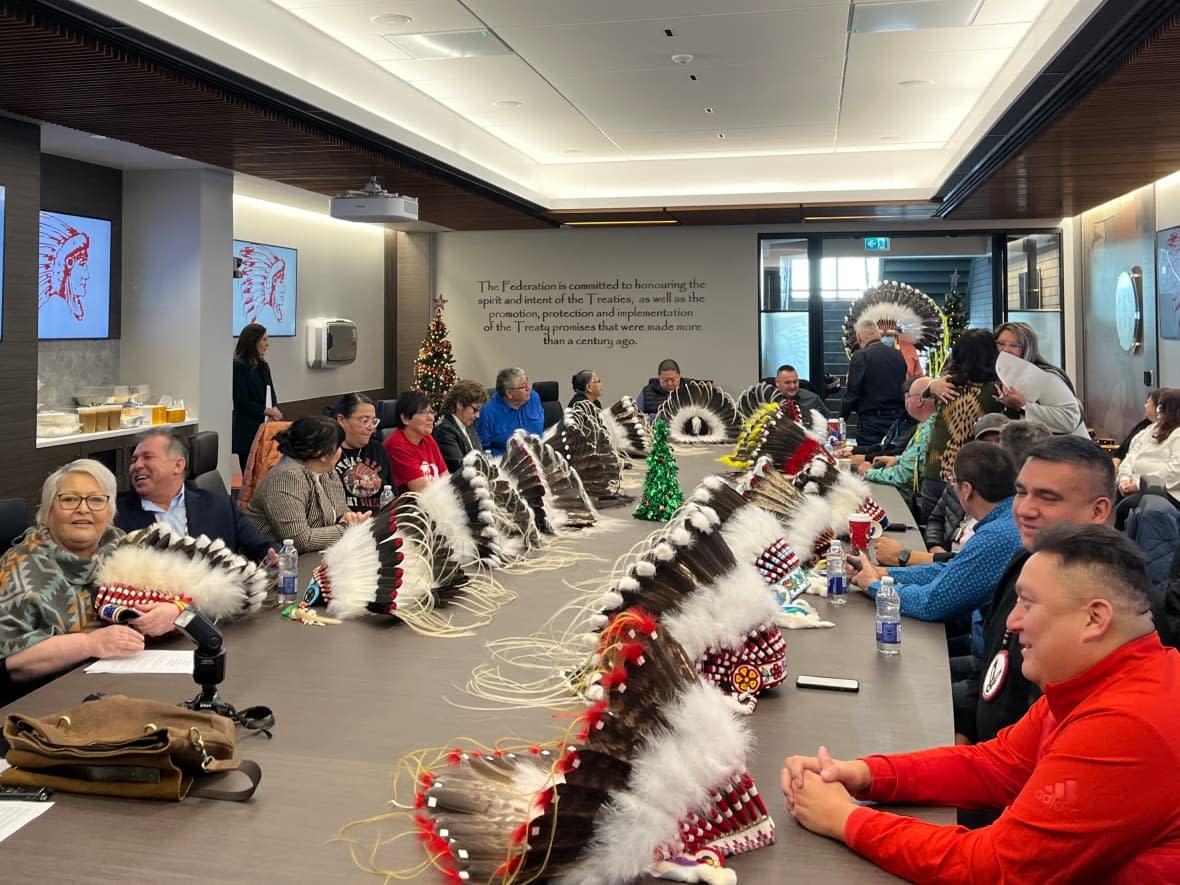First Nations leaders pan Sask. First Act, threaten legal action and blockades

First Nations leaders have a message for Saskatchewan Premier Scott Moe: kill the controversial Saskatchewan First Act or face blockades, legal action and other consequences.
"We have mandates from the chiefs in assembly to move forward legally [and] politically," Federation of Sovereign Indigenous Nations Chief Bobby Cameron said Friday afternoon.
"And we're about to the point where we're going to start blockading."
Cameron and dozens of other chiefs gathered in Saskatoon Friday, as what they say was a public show of force and unity against the act.
The provincial government introduced the Saskatchewan First Act this fall, calling it an assertion of exclusive provincial jurisdiction over natural resources and other rights. That claim is based on the controversial 1930 Natural Resources Transfer Agreement between the federal and provincial government.
However, First Nations leaders were not consulted before that 1930 agreement was negotiated.
They also say Indigenous rights and the numbered treaties — most of which predate the creation of the province of Saskatchewan by decades — supersede any provincial law. That principle has been upheld in numerous recent rulings by the Supreme Court of Canada, the United Nations and other bodies, they note.
Cameron said legal action is being initiated, and blockades could begin in the new year. That will be up to individual communities, Cameron said, but the Federation of Sovereign Indigenous Nations will be there to support them.
The resources the province is trying to assert jurisdiction over "are for our unborn children," said Moosomin First Nation Chief Cheryl Kahpeaysewat on Friday.
"Our ancestors did not sign away resources. They signed only to the depth of the plow for agriculture," she said, quoting the wording of one of the numbered treaties.
"Nothing in the Saskatchewan First [Act] acknowledges our treaties."
The leaders say the Saskatchewan government's introduction of the Saskatchewan First Act again ignores First Nations rights and history.
Lac La Ronge Indian Band Chief Tammy Cook-Searson said the act could infringe on access to traditional hunting and fishing practices, and shows "total disregard" for the First Nations people who live off the land.
Chief Roger Redman of Standing Buffalo First Nation said the provincial government has "no basis for this act."
"We are not going to stand by. We stood by for over 100 years of genocide forced on our people," Redman said.
In an email, a provincial government official said the Saskatchewan Act will not infringe on Indigenous and treaty rights, noting Section 35 of the Constitution Act recognizes those rights.
The spokesperson's email also noted that part of Saskatchewan's Legislation Act — Section 2-43 — says that no provincial act "abrogates or derogates from the existing Aboriginal and treaty rights of the Aboriginal peoples of Canada that are recognized and affirmed by Section 35 of the Constitution Act, 1982."
The Saskatchewan First Act is one of several recent moves by the provincial government to assert more autonomy, which also include the possible creation of a new police force and new method of collecting taxes.
The provincial government is also threatening to refuse to enforce new federal firearms laws.
Supporters of those ideas say Saskatchewan has been hampered by federal government over-reach, while critics say such moves will make things more cumbersome and expensive, and may be unconstitutional.


